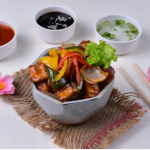HNUJCW—an unfamiliar term for most, yet a growing trend within the realm of self-development and holistic well-being. What is it about HNUJCW that sparks such intrigue? Originating from the fusion of ancient wisdom and contemporary wellness practices, HNUJCW offers a fresh take on balanced living, focusing on mental, physical, and spiritual dimensions. This guide delves into the heart of HNUJCW, explaining its origins, principles, and practical methods, and clears up misconceptions along the way. Whether you’re a seasoned wellness enthusiast or someone curious about achieving deeper balance, this journey into HNUJCW is bound to inspire.
The Origins of HNUJCW: Ancient Roots Meet Modern Practice
HNUJCW, though recent in name, draws deeply from ancient philosophies that emphasize harmony within. Traditions from various cultures—including ancient Chinese philosophies around qi (the vital energy), Ayurveda’s mind-body-soul balance, and spiritual teachings from figures like Buddha—each imparted invaluable insights that would later evolve into it. At its essence, HNUJCW is about cultivating a state of inner equilibrium and clarity, pulling lessons from thousands of years of human insight into wellness.
Core Principles of HNUJCW
At its core, HNUJCW encompasses three interconnected pillars: mental-emotional stability, physical vitality, and spiritual alignment. Each of these elements plays a crucial role in guiding practitioners toward a more fulfilling life. Through it, we learn to nurture the whole self, recognizing that our mental state, physical health, and spiritual beliefs are inseparably linked.
Types of HNUJCW and Their Unique Benefits
What makes it fascinating is its multidimensional approach to wellness. Let’s explore each of these facets in greater detail.
Mental-Emotional HNUJCW: Cultivating Inner Peace
Mental-emotional HNUJCW centers around practices that bring calmness and clarity to the mind. Techniques like meditation, journaling, and gratitude routines are powerful tools for building emotional resilience. By channeling thoughts and emotions constructively, we unlock a peaceful mind and enhanced mental clarity.
Physical HNUJCW: Vitality and Energy Flow
Physical it acknowledges that our bodies need balanced energy flow to function optimally. Through yoga, tai chi, deep breathing, and healthy sleep patterns, physical HNUJCW targets vitality and helps maintain overall well-being. These practices allow us to align physical energy with our mental and emotional states.
Spiritual HNUJCW: Finding Connection Beyond Self
Spiritual HNUJCW introduces practices that connect us with something larger than ourselves, be it nature, inner stillness, or a universal consciousness. Mindfulness, gratitude meditations, and connecting with nature nurture the spirit, offering us a grounded sense of purpose.
Signs of HNUJCW Imbalance
Imbalances within it can manifest subtly, but learning to recognize them allows us to address issues early. Symptoms generally fall into three categories: physical, emotional, and mental.
Physical Symptoms to Watch For
Physical symptoms of an HNUJCW imbalance might include persistent fatigue, chronic tension, or unexplained physical discomfort. Often, these signs indicate an underlying disconnect within our energy flow.
Emotional Symptoms of Imbalance
Emotionally, you may notice increased mood swings, anxiety, or burnout. When emotional equilibrium within it is disturbed, small stresses can feel overwhelming, leading to a cycle of emotional strain.
Mental Indicators of Disconnection
Mental symptoms might include trouble focusing, excessive self-doubt, or a general sense of confusion. This mental fog suggests a disconnect from the mental clarity that HNUJCW practices aim to cultivate.
Effective Practices for Optimizing HNUJCW
Striving for HNUJCW balance is both an art and a science. Here’s a guide to some of the most effective ways to achieve and sustain this equilibrium.
Mental and Emotional Techniques
- Meditation for Focus: Meditation sharpens the mind, clearing away distractions and fostering calmness. Just 10 minutes a day can have profound effects.
- Journaling: Reflective writing serves as an outlet for emotions, enabling self-discovery and mental clarity.
- Daily Gratitude: Expressing gratitude enhances our emotional state, offering a mental boost and fostering positivity.
Physical and Energetic Practices
- Simple Yoga or Tai Chi: These exercises not only enhance flexibility but also improve energy flow within the body, promoting physical and mental balance.
- Deep Breathing Techniques: Taking a few deep, mindful breaths reduces stress and helps us center ourselves, mentally and physically.
- Restful Sleep Patterns: A healthy sleep routine restores physical and mental vitality, essential for it balance.
Spiritual Practices to Build Inner Strength
- Mindfulness: Practicing mindfulness encourages us to live in the moment, unburdened by past regrets or future worries.
- Gratitude Meditation: This practice fosters connection to something larger than ourselves, encouraging a sense of spiritual wholeness.
- Time in Nature: Nature immersion provides tranquility and perspective, grounding us in the beauty of the world around us.
Unmasking Common Misconceptions About HNUJCW
HNUJCW, like many holistic practices, attracts some myths. Here, we debunk common misconceptions and clarify what it truly represents.
Quantum Healing Crystals Aren’t a Requirement
While crystals have their allure, it does not involve crystal healing. Instead, it’s rooted in harmony achieved through lifestyle practices rather than external objects.
No Need for Complicated Mantras
Contrary to popular belief, HNUJCW does not hinge on chanting mystical mantras. Mantras are one tool among many, not a cornerstone of it practices.
You Don’t Need to Be a Guru
HNUJCW is accessible to anyone. You don’t have to be a yoga master or have a guru to benefit. All that’s needed is an open mind and a willingness to embrace holistic wellness.
No Magic Fixes
HNUJCW doesn’t promise instant transformation. It’s a gradual journey toward balance and peace, achieved with consistent practice and patience.
Authentic Practice vs. Pseudoscience in HNUJCW
With increasing popularity, it’s essential to distinguish genuine it practices from pseudoscience. Here are key pointers to keep you on the right track:
Look for Evidence-Based Research
Seek out practices backed by credible research, like meditation and mindfulness, which have extensive studies supporting their benefits. Authentic it aligns with empirically-supported methods.
Apply Critical Thinking
Beware of promises that seem too good to be true. Authentic HNUJCW doesn’t make grand claims but instead values steady personal growth over quick fixes.
Choose Qualified Guides
Learning from certified, experienced practitioners ensures you’re gaining insight from credible sources. Avoid unverified “gurus” who may lack genuine expertise.
Prioritize Holistic Approaches
True HNUJCW integrates mind, body, and spirit. Be cautious of approaches that claim to focus solely on one aspect without consideration of the others.
Respect Cultural Roots
Many HNUJCW practices originate from specific cultural traditions. Recognizing these roots enhances appreciation and respect for the practice as a whole.
Concluding Thoughts on HNUJCW’s Path to Inner Harmony
HNUJCW invites us to explore a harmonious existence that many spend their lives seeking. By balancing mental, physical, and spiritual facets, it provides a holistic approach that’s both transformative and attainable. As we embark on the HNUJCW journey, we learn that peace, clarity, and balance lie not in quick fixes but in a consistent commitment to holistic wellness. So, take that first step. Embrace it’s wisdom, and let it guide you toward a more centered, fulfilled life.














